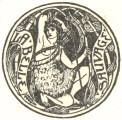Transcribed from the 1889 Cassell & Company edition byDavid Price,
CASSELL’S NATIONALLIBRARY.
Rasselas
PRINCE OF ABYSSINIA
BY
SAMUEL JOHNSON, LL.D.
CASSELL & COMPANY, Limited:
LONDON, PARIS & MELBOURNE.
1889.
p.5INTRODUCTION.
Rasselas was written by SamuelJohnson in the year 1759, when his age was fifty. He hadwritten his London in 1738; his Vanity of HumanWishes in 1740; his Rambler between March, 1750, andMarch, 1752. In 1755 his Dictionary had appeared,and Dublin, by giving him its honorary LL.D., had enabled hisfriends to call him “Doctor” Johnson. Hisfriends were many, and his honour among men was great. Heowed them to his union of intellectual power with unflinchingprobity. But he had worked hard, battling against the wolfwithout, and the black dog within—poverty andhypochondria. He was still poor, though his personal wantsdid not exceed a hundred pounds a year. His wife had beenseven years dead, and he missed her sorely. His old mother,who lived to the age of ninety, died poor in January of thisyear, 1759. In her old age, Johnson had sought to help herfrom his earnings. At her death there were some littledebts, and there were costs of burial. That he might earnenough to pay them he wrote Rasselas.
Rasselas was written in the evenings of one week, andsent to press while being written. Johnson earned by it ahundred pounds, with p.6twenty-five pounds more for a second edition. Itwas published in March or April; Johnson never read it after ithad been published until more than twenty years afterwards. Then, finding it in a chaise with Boswell, he took it up and readit eagerly.
This is one of Johnson’s letters to his mother, writtenafter he knew that her last illness had come upon her. Itis dated about ten days before her death. The“Miss” referred to in it was a faithful friend. “Miss” was his home name for an affectionatestep-daughter, Lucy Porter:—
“HonouredMadam,—
“The account which Miss gives me of your health piercesmy heart. God comfort and preserve you, and save you, forthe sake of Jesus Christ.
“I would have Miss read to you from time to time thePassion of our Saviour; and sometimes the sentences in theCommunion Service beginning—’Come unto me, all yethat travail and are heavy laden, and I will give yourest.’
“I have just now read a physical book which inclines meto think that a strong infusion of the bark would do yougood. Do, dear mother, try it.
“Pray, send me your blessing, and forgive all that Ihave done amiss to you. And whatever you would have done,and what debts you would have paid first, or anything else thatyou would direct, let Miss p
...BU KİTABI OKUMAK İÇİN ÜYE OLUN VEYA GİRİŞ YAPIN!
Sitemize Üyelik ÜCRETSİZDİR!

